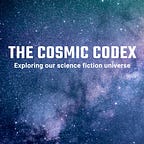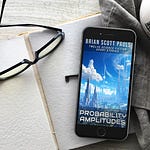by Brian Scott Pauls, written using ChatGPT
I’ve been experimenting in The Cosmic Codex with artificial intelligence (AI). The mission of this publication is “exploring our science fiction universe.” This includes AI tools that have gone from science fiction to reality in the past few years.
Today, effective communication isn’t only about good writing. Combining text, graphics, and audio is important in many contexts. A multifaceted approach is often the best way to convey complex information.
Creating this type of presentation can be challenging. It calls for a variety of skills difficult for any one person (definitely me!) to master. This is where specialized AI tools come into play.
At this stage of development, at least, I’ve found that—rather than posing a threat to replace me—AI enhances my work. I’m confident this technology represents a new toolkit for humanity. It will be our partner, not our successor.
I’ve found the following AI tools to be helpful in my work on The Cosmic Codex:
Developed by OpenAI, ChatGPT is a natural language processing tool for producing human-like text responses. The algorithm “…can analyze the target audience…” and topic of a presentation, to generate relevant text. While ChatGPT can perform many tasks, I use it to create the initial drafts of fact-based articles. I’ve found it to be like a sloppy or dim-witted research assistant. It will create a framework on which I can build, but the details don’t come with source links and most of them are wrong. It’s also quite repetitious and sounds nothing like my authorial “voice.” As you can imagine, ChatGPT output requires extensive revisions.
I see the potential of this technology. One day, I expect it will become indispensable for analytical writing, even journalism.
Orpheus Technology’s ProWritingAid analyzes text and suggests changes to improve the quality of the writing. It can check grammar, assess style, and (for an extra fee) review for plagiarism. It helps ensure written content is error-free, concise, and engaging.
ProWritingAid is an indispensable part of my writing process—especially for these articles. No one else reviews them before publication. It's my way of catching many spelling and grammatical mistakes. I recommend it for anyone writing to an audience.
Software developer .38 Long LLC's Hemingway analyzes your written text, then suggests changes to improve readability and clarity. It “…corrects grammar, fluency, and sentence structure in order to help your writing read and look better.” Available both online and as a desktop application, Hemingway “…highlights lengthy, complex sentences and common errors…”. It suggests simpler replacements for tough words. It also points out where you can strengthen your writing. Examples include removing adverbs and “weakening phrases”, as well as replacing the passive voice with the active.
ProWritingAid is my primary AI style and grammar checker. I also use Hemingway because I like the way it flags sentences it identifies as complex or difficult to read. I can then consider simplifying the way I present my ideas before I put them in front of the public.
MicMonster, from the company of the same name, uses text-to-speech technology to create voiceovers in “…140 languages including…multiple accents.” While it claims to be “…powered by most realistic text to speech engine...”, its output still sounds like a machine-generated voice. It has a limited range of inflection and can’t interpret standard formatting for emphasis like italics and ALL CAPS.
Whether this is a problem may depend on your readers. I have a friend in my age demographic who finds it unpleasant to listen to a story narrated by MicMonster. Yet the prevalence of AI voices on Gen Z-leaning TikTok may show a growing market for this form of communication. Creators must balance the affordability of AI against the quality of live recordings.
HeiTech, a new product from the creator of MicMonster, uses speech-to-text and text-to-speech technology to create subtitles, transcriptions, and even translated voiceovers. It allows me to create subtitles for The Cosmic Codex’s YouTube channel.
As with ChatGPT, it’s not perfect. Once the program generates the subtitles, I’ve found I need to go through and clean them up, then re-render the video.
Still, it’s much more efficient than my first video, where I used iMovie’s title functionality to create the on-screen text. This took me a couple of hours. Even with the required clean-up, the same task requires about 30 minutes in HeiTech.
Midjourney is the name of both an organization and its product, which “…creates images from textual descriptions”. This is how I produce most of the digital illustrations for my articles in The Cosmic Codex.
Of course, Midjourney and other AI image generators have been much in the news recently. Along with Stability AI, Midjourney is currently facing a lawsuit for using images publicly available on the web to train their algorithm. We are still working out where machine learning, which uses large data sets for training, stands regarding copyright law. Is machine learning like human learning? No one gets on your case if you look at a bunch of existing images when learning to draw. Or is using existing images to establish values in a database copyright violation—even if the final output is unique?
Whatever the outcome, AI-generated art probably isn’t going away—and unlike AI-generated voices, it’s already very good. Tools like this give small creators the ability to better communicate our ideas using original, evocative illustrations. We might never be able to afford this if we had to use human artists—and the tools produce those images in a fraction of the time.
Issues to Explore
As we integrate AI into our work, science fiction can help us imagine what lies ahead:
Automating the Fourth Estate
A new owner has purchased the largest newspapers and cable news stations in the country. Within a year, they have replaced all editors and journalists with sophisticated AI. It collects data from all over the United States, producing local, state, and national news. Production costs drop compared to those of the few remaining human-staffed outlets. What happens when a journalist suspects the AI isn't just reporting the news—it’s influencing events to make the news?
A popular “infotainment” program trains its algorithm on decades of partisan news broadcasts. When an AI-generated story crosses the line into slander, the producers face a lawsuit. Their defense is the AI created and edited all content. An artificial intelligence program goes on trial for the first time. Who or what is responsible for its work—the software, its owners, or the developers and trainers of the algorithm?
Make better decisions with Big Data!
An online trading portal filters users’ views to display only securities meeting certain criteria. This allows comprehensive boycotts of any company or nation. How might bad actors try to game the system, making their clients look more virtuous than they are?
By combining genetic, actuarial, and health system databases with personal medical information, AI can make the most accurate predictions ever about the life expectancy of any individual. What might be the unanticipated social, economic, or political consequences of knowing with reasonable certainty when you or others will die?
A meta-analysis of mobile phone tracking data from all major carriers reveals disturbing patterns portending violent unrest. If the government doesn’t act on this information, a revolution might erupt. If they do act, and awareness of their interference becomes public, that could spark a revolution. How can they protect the country without becoming the tyrants their detractors claim them to be?
Who owns your information?
Congress has tasked the executive branch with protecting the privacy of every American. New regulations impose stiff penalties on anyone trafficking in data tied to a particular person. This hampers the online advertising industry, while creating a new industry of “aggregators”. These companies take in massive amounts of data and “scrub” it of personal details. Is life for the average citizen better or worse under this new system?
You receive the job opportunity of a lifetime—great pay, benefits, and flexibility. The catch? You sign away your right to all your personal data. An AI will track you 24x7 for the rest of your life, collecting data for machine learning. Do you take the job?
AI can save time, effort, and money by automating parts of the creative the process. ChatGPT can even analyze an audience's preferences and tailor the content. Applications which help create images and videos can make a presentation more appealing and informative.
But these tools rely on algorithms and may not always produce the desired outcome. AI can’t replicate human intuition. It will often produce drafts requiring many changes. An author who relies too much on AI risks depriving their work of their own personal touch.
My examples focus on communication. AI specializing in other areas will have similar strengths and weaknesses.











